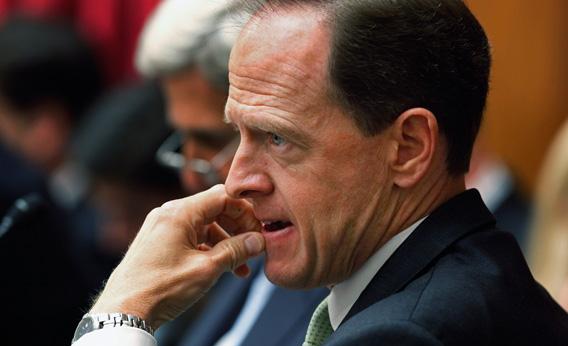If you think that political leaders can’t link arms and get things done, you haven’t been watching the aftermath of the supercommittee. Sure, the 12-member team of rivals never came up with a deficit-shrinking plan. Its existence cheapened the prefix “super” more than anything since Superman IV: The Quest for Peace. But when the Gang of 12 died, the six Republicans who killed it formed a new pact: They would tell the history of the superfailure and the debt crisis the way it should be remembered. Oh, that embarrassing slapstick collapse? It was the other side’s fault.
Democrats absorbed the collapse and moved right along. After issuing a statement and giving a punchy press conference, respectively, Sens. Patty Murray and John Kerry basically stopped talking about it. Rep. Jeb Hensarling, co-chairman of the committee, signed off on the statement immediately before the Wall Street Journal published his woe-is-us op-ed.
“Republicans were willing to agree to additional tax revenue,” he wrote, “but only in the context of fundamental pro-growth tax reform.” Alas. “The Democrats said no. They were unwilling to agree to anything less than $1 trillion in tax hikes—and unwilling to offer any structural reforms to put our health-care entitlements on a permanently sustainable basis.”
Three days later, Hensarling combined his powers with his five Republican cohorts; all six of them published an op-ed (this time in the Washington Post) blaming failure on the Democrats’ wanting “$1 trillion in tax hikes.” This week, as they returned from the holidays, the two committee Republicans who’d gotten the most ink tag-teamed the podiums of the think tanks that sponsored the last GOP presidential debate. Sen. Rob Portman, a freshman and Bush administration veteran who’d called on Republicans to “pull back from our purity test,” headed to the American Enterprise Institute. Sen. Pat Toomey, a freshman who’d offered the GOP’s most substantive superdeal, went to the Heritage Foundation.
The speeches took place 24 hours apart—just the right amount of time to gin up déjà vu.
Portman on Monday: “The economic policies that this administration has followed, and what this Congress did in the first two years of the Obama administration, has made the problems even more urgent, because they have accelerated the potential for an economic and fiscal trainwreck.”
Toomey on Tuesday: “What happened that brought about the massive budget deficits and the mounting debt that caused this committee to come into being, was, fundamentally, a spending spree. Remember, it’s been this sequence of stimulus bills, and bailouts, and government takeovers—a huge surge in discretionary spending.”
Portman again: “Some would say that the answer is raising tax rates, that our current rates can never generate the revenue needed to govern this big and complex country. I would remind us that several years ago, only four years ago, in 2007, we had almost a balanced budget with the same tax code we had today, and the same tax rates.”
Toomey again: “As recently as 2007, the very tax rates we have today, this code, generated revenue that was about the historical average, 18 percent of GDP. And with revenue at 18 percent of GDP, we had a deficit that was almost trivial in size.”
What we’re supposed to hear, and hear, and hear, is that Democrats didn’t care as much about reducing the deficit as the GOP did, that they were obsessed with hiking taxes, and that they wanted the whole shebang to fail to prove a point. The reason Republicans keep saying this, as Jonathan Chait explains, is that it looks to most people like they triggered the supercollapse because they wouldn’t deal on taxes. Sen. Tom Coburn’s mega-compromise, the nucleus of a “Gang of Six” deal that would raise some taxes while cutting spending, got nowhere. The “grand bargain” that Speaker John Boehner flirted with in the summer, the one that could have averted the debt crisis, couldn’t pass a Republican Congress. A Gallup poll about the failure had voters blaming the GOP by a 3-to-2 margin (all voters) or a 2-to-1 margin (independents).
These heroic, random Americans who answered calls from pollsters have a point. The Republicans actually admit it when they argue that Democrats wouldn’t deal with them. Saying that the other party wanted “$1 trillion in new taxes” is saying that you wouldn’t compromise on taxes. Defending the 2007 tax rates—sure enough, at the height of an unrepeatable economic bubble, they were enough to fund the government—is winking at the way Republicans demanded a permanent extension of the Bush tax cuts in order to deal.
But Republicans need to convince the country, or at least the pundit class, that a deal was possible before Democrats brought a hunk of kryptonite to the meetings. They’re still figuring out how to say it. Chris Christie got pretty close, taking full advantage of his role as a blunt talker whose rants are more often YouTubed than fact-checked. He blamed both parties for the failure, then blamed the president for not knocking heads together the way—well, the way Chris Christie would. “What the hell are we paying you for?” asked Christie. Inconveniently enough, the White House had hinted at what it wanted in a deal, and the summer negotiation meltdown convinced Republicans that they didn’t want the president to meddle in the supercommittee.
The Portman/Toomey tag-team might be helping, too. Dana Milbank, whose July interview with a sensible-sounding Portman helped create the impression that he’d deal, came back from the AEI speech with a heart full of hope. Portman was a “genuine grown-up,” and a good vice presidential nominee. Over at National Review, Jim Geraghty was floating Toomey as a vice presidential nominee. Neither guy has the overpowering charisma you typically want from a running mate. But if they convince people that a debt deal could have been saved if it wasn’t for those dastardly Democrats, they’ll show hall-of-fame political chops.
